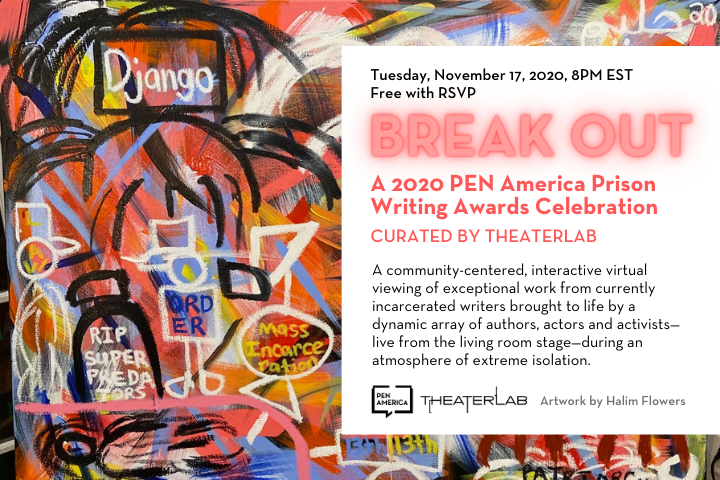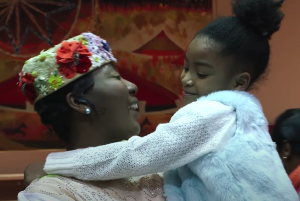Temperature Check, Vol. 10: Family Through The Walls

A responsive series from PEN America’s Prison and Justice Writing Program, featuring original creative reportage by incarcerated writers, accompanied by podcast interviews with criminal justice reform experts on the pandemic’s impact in United States’ prisons.
Volume 10.0 Table of Contents
- Introduction: Frances Keohane
- Dispatch: Amy Bishop Anderson
- Podcast: Ebony Underwood and Dunasha Payne
- Advocacy, Action and Resource Roundup
Introduction To Volume 10.0:
family through the walls
Dear Readers,
On Tuesday November 17, we are thrilled to host “Break Out,” a community-centered, interactive virtual event celebrating the release of the 2020 PEN America Prison Writing Awards anthology and honoring our writers’ exceptional work. Selected pieces from the collection will be brought to life by an array of authors, actors, and activists curated by TheaterLab—an innovative performance organization based in New York City. We hope you will consider joining us.

Join us the evening of November 17th at our virtual “Break Out” event to celebrate the release of our 2020 Prison Writing Awards Anthology
In this issue of Temperature Check, we honor a beautiful and gripping piece of fiction from this collection, Amy Bishop Anderson’s “Man of Few Words,” using it as a lens to explore the difficult complexities that define familial relationships through bars, made more extreme by COVID-19.
Today, there are some 2.3 million Americans behind bars. What this number fails to include, however, are the millions of others encompassed by the ripples of incarceration. Indeed, the loved ones of people behind bars are often referred to as the “hidden victims” of the criminal justice system—they, too, encounter the separation, shame, and stigma that define incarceration, but are rarely recognized or prioritized.
Unsurprisingly, research shows that strong family ties deter future recidivism. Continued and healthy connections through bars are beneficial not only for the incarcerated individual, but also for the loved one on the outside and especially for the children of incarcerated parents. Federal and state governments, however, often fail to provide environments that foster or encourage healthy relationships. In-person visitation is made burdensome by extensive travel expenses and distances, stressful and time-consuming checks, and inconvenient visiting hours, among other factors that actively discourage family members from visiting.
When they can’t visit in person, loved ones resort to phone or email services, both of which are heavily monitored and censored. Prisons and jails have profited immensely by granting monopoly contracts to companies that charge families exorbitant rates for communication services.
Before the pandemic, one in three families of incarcerated people were falling into debt just by paying for prison phone calls. As the pandemic hit, correctional facilities began suspending in-person visitation, leaving families with no choice but to pay these excessive fees. With pressure from advocacy groups across the country, the federal prison system made all prison phone calls free—but most local and state systems have failed to follow suit.
Restrictions brought on by the coronavirus have been stressful for families everywhere, ushering in an era of isolation, uncertainty, and fear. For people with incarcerated loved ones, this anxiety is heightened, as communication from inside becomes infrequent and unreliable. A 2020 report by the Essie Justice Group, Lives on the Line, reveals how “facilities have exploited the virus as an opportunity to further server connections between incarcerated people and their support networks.”
With sporadic and hurried lockdowns in facilities, families can go weeks—or months—without being able to speak to, exchange letters with, or check in with their loved ones. Indeed, 94 percent of survey respondents to Lives on the Line had not received any or had received inadequate health-related information about their incarcerated loved one. Sixty-two percent described that their incarcerated loved ones were scared of losing their lives. Fifteen percent reported that the children they cared for experienced increased anxiety and depression.
As this last statistic reveals, the psychological strain of incarceration on children of parents behind bars is extensive. More than 1.1 million men and 120,000 women in U.S. jails and prisons have children under the age of 18. 2.7 million children—or one in every 28—have a parent behind bars. And these numbers differ by demographic, disproportionately affecting families of color: More than one in nine Black children have a parent in prison or jail, and one in two Black women has a family member in prison.
This issue’s Works of Justice Podcast features two powerful conversations with those closest to the issue. In part one of this episode, we spoke with Ebony Underwood, founder and CEO of We Got Us Now, a national nonprofit organization built by, led by, and about children of incarcerated parents. In part two, Caits Meissner, our program director, had a raw and honest discussion with Dunasha Payne, program coordinator of Drama Club NYC’s Young Women’s Initiative, in which the latter shared her experiences parenting through the walls.

Dunasha Payne and her daughter, Jayla, reunite at the performance of “The Wiz” at Bedford Hills, in which Dunasha played Glinda the Good Witch.
Whether or not we have direct experience with the incarceration of our loved ones, many of us can attest to the power of familial relationships. To ensure that as many people as possible—particularly those with justice involvement—are given opportunities to maintain these connections, please check out our advocacy section below.
Thank you for engaging.
In solidarity,
Frances Keohane, PEN America
Prison and Justice Writing Fellow 2020
The PEN America Prison and Justice Writing Team:
Caits Meissner, Program Director
Robert Pollock, Program Manager
Mery Concepción, Volunteer Coordinator
Frances Keohane, 2020 Program Fellow
Nicolette Natale, Works of Justice Podcast Producer
Jenna Bao, Fall 2020 Program Intern
Dispatch From Inside

Original art created expressly for Amy Bishop Anderson’s piece by Chad Merrill, an artist curated by the Justice Arts Coalition for our forthcoming Prison Writing Awards anthology
Amy Bishop Anderson’s “Man of Few Words” won second place in Fiction in this year’s Prison Writing Contest. Though fiction, her moving words about the challenges—both physical and emotional—of maintaining family connections through the bars ring true. Anderson’s piece is short but poignant; though its setting is carceral, the themes of raw human connection in the face of severance and hardship are universal, reaching beyond the walls.
MAN OF FEW WORDS
by AMY BISHOP ANDERSON
I only have a few minutes remaining on my prison phone account so my husband, Jackson, and I race through the logistics common to marriage: kids, school, taxes. Then Jackson, normally a man of few words, tells me about Sharon, a friend from our old life in Boston.
“Sharon’s just gotten divorced.
“That’s too bad,” I reply.
Our kids and her girls grew up together and they socialize every time my family returns to Boston to visit my parents. I hope Sharon gets the house.
The kids pass around the phone and we exchange I love yous before Jack takes it again. I can always tell when he does. I hear his breathing—not labored, but there in my heart. I tell him I love you, but he does not tell me the same. Not since I’ve been incarcerated has he said, I love you. Who can blame him?
For ten seconds that I thankfully don’t remember, I became horror. I, a law-constrained mother and assistant professor of Biology, am in Tutwiler Prison, Butthole, Alabama on Life Without Parole. We moved to Jackson’s home state for my exalted faculty position.
Then Jack says something new. “Remember the first powwow I took you to?”
“I remember.”
Continue reading “Man of Few Words”
Works of Justice Podcast Interviews
part I: WRITER, ADVOCATE, AND ACTIONIST EBONY UNDERWOOD ON Parental incarceration
 Founder and CEO of We Got Us Now, a nonprofit advocacy organization that amplifies the stories of and challenges faced by children and young adults with incarcerated parents, Ebony Underwood is a leader in the fight to expand awareness of and rights for the millions who have experienced parental incarceration. In this podcast episode, Underwood speaks intimately and powerfully about her dad’s incarceration and its effects on her various and intersecting identities: advocate, social entrepreneur, actionist, daughter, and writer. She also details the impact of COVID-19 on the recent efforts of We Got Us Now.
Founder and CEO of We Got Us Now, a nonprofit advocacy organization that amplifies the stories of and challenges faced by children and young adults with incarcerated parents, Ebony Underwood is a leader in the fight to expand awareness of and rights for the millions who have experienced parental incarceration. In this podcast episode, Underwood speaks intimately and powerfully about her dad’s incarceration and its effects on her various and intersecting identities: advocate, social entrepreneur, actionist, daughter, and writer. She also details the impact of COVID-19 on the recent efforts of We Got Us Now.
Listen to the 40-minute conversation on our Works of Justice podcast:
Click here to access the transcript or listen on Apple Podcasts Spotify Google Play
part II: ACTOR, MENTOR, AND MOTHER DUNASHA PAYNE ON parenting THROUGH THE WALLS AND THE POWER OF THEATER
 In Part II, we meet Dunasha Payne through an intimate and moving conversation about parenting behind bars. Payne is an alumna of Rehabilitation Through The Arts, which provides extensive arts access behind the walls of six New York State correctional facilities. There, she proved herself as a talented writer, actor, and singer. She is now the program coordinator of the Young Women’s Initiative at Drama Club, a nonprofit organization that provides theater programming and mentorship to young, justice-involved individuals in New York City.
In Part II, we meet Dunasha Payne through an intimate and moving conversation about parenting behind bars. Payne is an alumna of Rehabilitation Through The Arts, which provides extensive arts access behind the walls of six New York State correctional facilities. There, she proved herself as a talented writer, actor, and singer. She is now the program coordinator of the Young Women’s Initiative at Drama Club, a nonprofit organization that provides theater programming and mentorship to young, justice-involved individuals in New York City.
In her current work, Payne pulls from her intersecting experiences—as a justice-involved woman, as a mother, and in the arts—to mentor and connect meaningfully with the young people she teaches.
Listen to the 40-minute conversation on our Works of Justice podcast:
Click here to access the transcript or listen on Apple Podcasts Spotify Google Play
Advocacy, Action and Resource Round-Up
NATIONAL ORGANIZATIONS
-
Visit We Got Us Now and sign their petition, “#ProtectOurParents: COVID-19 VIRUS: Children of Incarcerated Parents Demand Action to Protect Our Parents Behind Bars.”
- Check out the vast collection of books on the issue of children of incarcerated parents from directly impacted authors, researchers, and those most interested in putting an end to mass incarceration, also on We Got Us Now’s website.
- Learn about and support Alliance of Families for Justice, an organization whose mission is to empower and mobilize families and individuals impacted by the criminal justice system.
- Learn about and volunteer with Hope House, which strengthens families and relational bonds between incarcerated parents (primarily fathers) and their children and seeks to reduce the isolation, shame, stigma, and risk association with incarceration.
- Learn about and support The Messages Project, a nonprofit organization that enables children of incarcerated parents to maintain and rebuild relationships with their mothers and fathers.
- Learn about and support Worth Rises, an advocacy organization dedicated to dismantling the prison industry and its economic exploitation of families with incarcerated loved ones.
LOCAL ORGANIZATIONS
-
Identify and support your local organizations, such as The Osborne Association in New York, that support families with incarcerated loved ones.
LEGISLATIVE ACTION
-
Contact your representatives, urging them to cosponsor H.R. 6389, the Martha Wright Prison Phone Justice Act, which provides caps for rates of communication services in confinement facilities.
-
Contact your representatives, urging them to cosponsor H.R. 3795, the Second Look Act, allowing incarcerated individuals to petition a Federal court for a second look at sentences longer than 10 years.
-
Contact your representatives, urging them to cosponsor H.R. 7718, the Protecting the Health and Wellness of Babies and Pregnant Women in Custody Act.
- Sign We Got Us Now’s petition by children of incarcerated parents, an open letter to the federal and state officials demanding urgent action to protect their parents behind bars.
-
In New York State:
- Contact your state officials and urge them to co-sponsor A5942 and S731A, the Visiting Bus Bill, that would reinstate the free visit buses providing children and families with bimonthly free transportation to New York State prisons.
- Contact your state officials and urge them to co-sponsor A2483 and S2698, the Codification of In-Person Visiting Bill, that would support the legislative codification of in-person visits in New York State prisons and county jails, ensuring that in-person visits will never be taken away from a child when their parent is incarcerated.
ARTS BEHIND BARS
- Check out the Justice Arts Coalition, a national network and resource for those creating art in and around the criminal legal system. Become a member or donate; sign up to volunteer; and explore their resources for books, articles, films, and other publications, among other opportunities.
-
Use the guides compiled by the Justice Arts Coalition to identify the prison arts program(s) in your state, such as Rehabilitation Through the Arts and Drama Club NYC, and consider supporting the meaningful work of these organizations.
- New England (NH, MA, RI, CT, ME, VT)
- Mid-Atlantic (NY, PA, NJ, D.C.)
- South (DE, MD, VA, WV, NC, SC, GA, FL, AR, LA, KT, TN, MS, AL)
- Midwest (WI, MI, IL, IN, OH, MO, ND, SD, NE, KS, MN, IA)
- Southwest (AZ, NM, OK, TX)
- Rocky Mountains (ID, MT, WY, NV, UT, CO)
- Pacific Coast (WA, OR, CA, HI, AK)






